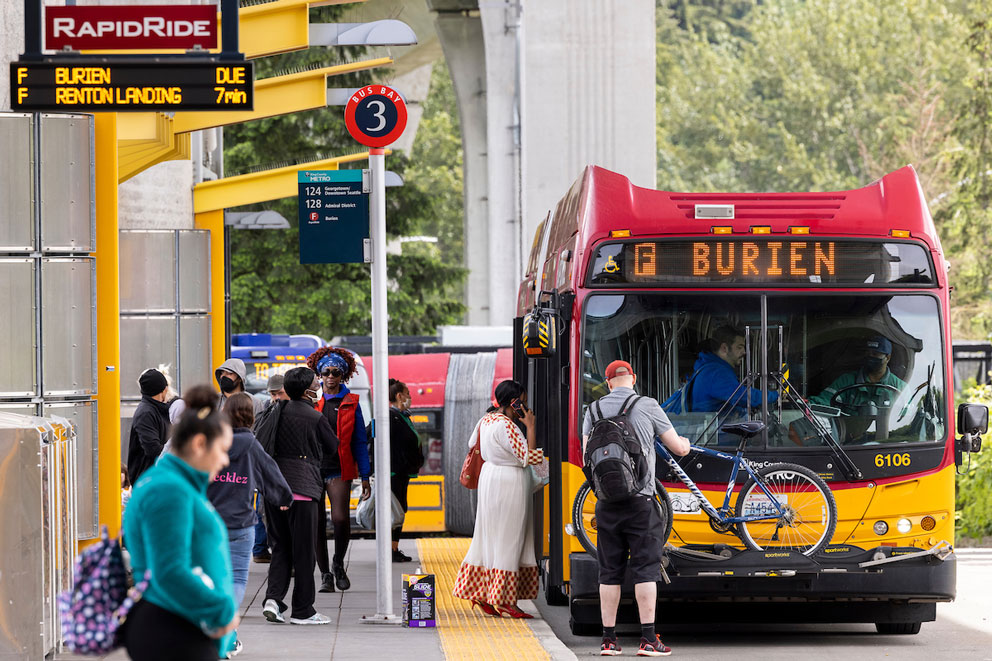Fare policy
Transit fares are a very important source of income for transit agencies around the world. At Metro, county code requires that part of our funding come from fares. Fares help Metro provide current transportation service and grow our transit system in the future. Metro is committed to making sure the cost of fares doesn’t keep people from riding transit.
Fares Forward Initiative
Metro is launching a multiple-part Fares Forward Initiative in 2023-2026, to make our fare program more equitable, easy to use, and easy to operate. The four project areas of this initiative include:
Metro offers a variety of reduced fare programs, but they’re not always easy for customers to use or for staff to operate. Metro is working to change that.
Starting in 2023, Metro will bring together riders, human service agencies, transit partners and others to improve reduced fare programs like the ORCA LIFT program for low-income riders, the Regional Reduced Fare Permit for senior and disabled riders, the subsidized annual pass for participants in some government programs, and the Human Service Bus Ticket Program that helps service providers and community groups get bus tickets to their clients.
- Metro and other public transit agencies in the region are introducing new tools to make it easier to buy, load and use ORCA cards and other non-cash payment methods. These improvements save riders money and make it easier to transfer between different agencies and types of transit.
- Long term, Metro is moving towards eliminating cash fare payment on buses.
- Beginning in 2023, Metro will work with community to create a plan and timeline for this cashless transition. We will be working to figure out what technologies, community outreach, partnerships and other tools need to be in place before cash is removed as an option—that way, cash payers will have time to connect to other methods.
- County code requires Metro to collect a part of our funding through transit fares.
- For the 2025 county budget process, Metro will propose changes to these code requirements to reflect current bus ridership patterns and assumptions for future growth, in addition to other data.
Metro is always working to make it easier and more affordable for riders to choose transit.
Over the next few years Metro will continue connecting riders to the right fare through ORCA, with a focus on handing out cards, partnering with community-based organizations and increasing the number of retail stores that let you buy and load ORCA cards.
Feedback opportunities
Metro will seek community input to better understand the needs and priorities of communities most affected by possible changes to our fare system.
Fares Cabinet
Metro will create a Fares Cabinet, made up of community members most affected by new fare policies/those who may have been left out of important conversations like these in the past. Cabinet members will give Metro their opinions on fares projects and ways to best reach out to the public.
The Cabinet will meet regularly throughout 2024, and members will be paid for their participation and feedback.
Regional coordination
The success of Metro’s Fares Forward initiative also depends on participation from our regional transit agency partners. For this reduced fares work, Metro will establish a special project group with representatives from our partner agencies. Metro will also provide updates and seek input from partner transit agencies through existing subcommittees and other regional meetings.
Community-based organization partnerships
Metro will recruit community-based organizations to serve as outreach partners that will ask priority communities for feedback on Metro’s behalf. Metro will pay these organizations for their expertise and time spent developing and carrying out engagement activities fitting for their cultures and clients.
Partner engagement
Metro will also invite members of community organizations to review and provide comments on project priorities and direction from the Fares Cabinet.
 Translate
Translate
